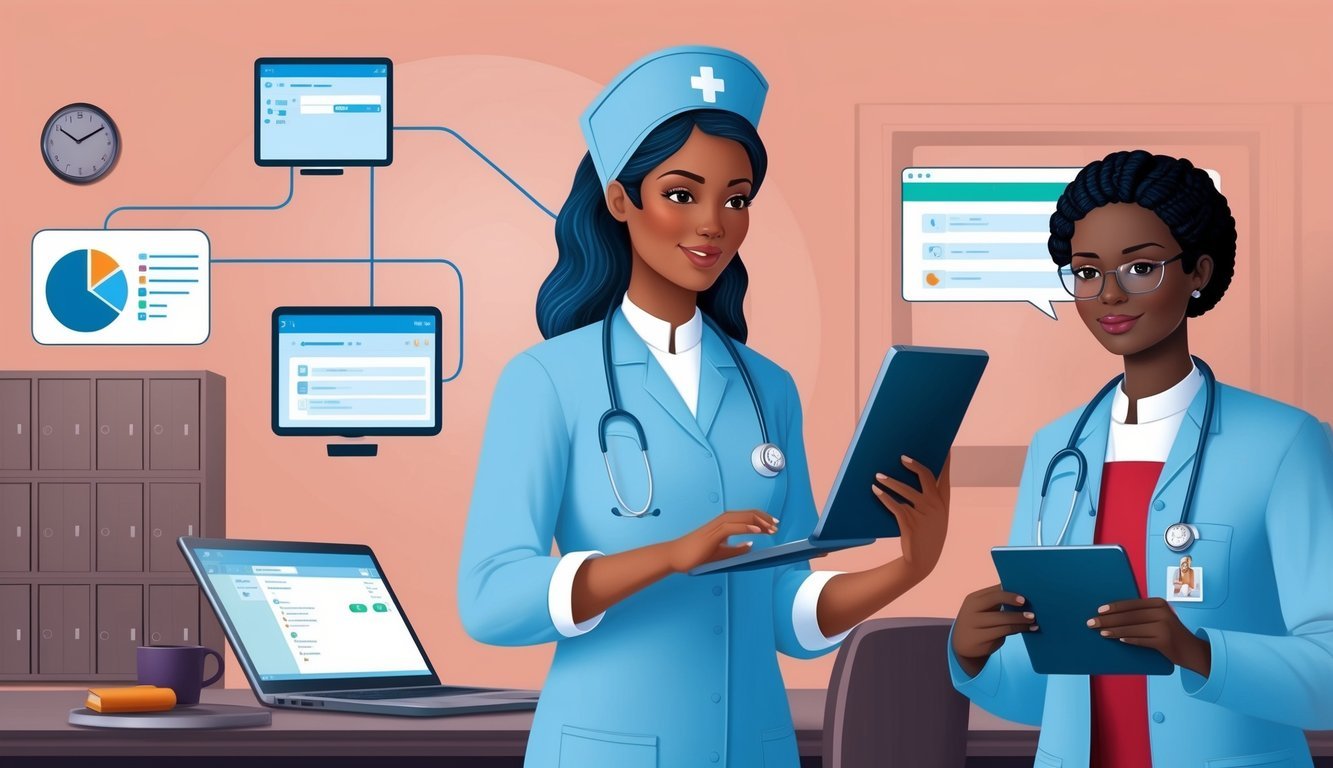As healthcare continues to evolve, the field of nursing informatics has become increasingly vital.
The growing need for professionals who can merge technology with patient care has driven the demand for nursing informatics.
This merging helps improve efficiency, patient outcomes, and overall healthcare quality.
With healthcare organizations moving towards digital solutions, nursing informatics offers exciting career opportunities.
Those in nursing informatics play a key role in integrating clinical practices with data management systems.
Educational pathways in this field include specialized degrees and certifications that prepare you for various roles within healthcare settings.
As you consider a career in this area, you may find that the demand continues to rise, opening doors to significant advancements and leadership positions.
Investing in nursing informatics not only benefits your career but also enhances the healthcare system.
By understanding the role of technology in patient care, you can make a meaningful impact while advancing your professional journey.
Key Takeaways
- Nursing informatics is crucial for integrating technology into healthcare.
- There are numerous educational and certification pathways available.
- The demand for nursing informatics professionals is expected to grow significantly.
The Role of Nursing Informatics in Healthcare
Nursing informatics plays a crucial role in enhancing healthcare delivery and patient outcomes.
This specialty combines nursing with information technology to improve patient care, streamline processes, and advance health outcomes.
You will see how nursing informatics supports healthcare systems through effective use of data and technology.
Defining Nursing Informatics
Nursing informatics is the integration of nursing science, computer science, and information management.
It focuses on managing and communicating data to support nursing practice.
Informatics nurses use technology like electronic health records (EHRs) to capture patient information efficiently.
These specialists analyze data to improve care and safety.
They also provide education to other nurses on using these systems effectively.
By ensuring nurses know how to use data correctly, informatics nurses help protect patient privacy and optimize clinical workflows.
Impact on Patient Care and Outcomes
The use of nursing informatics significantly impacts patient care and health outcomes.
By utilizing clinical decision support systems, nurses can make better decisions based on accurate data.
This technology alerts nurses to potential risks, such as medication interactions, enhancing patient safety.
Moreover, informatics helps in tracking patient progress through health informatics tools.
This allows for timely interventions when necessary.
With accurate data analysis, healthcare teams can identify trends and make informed decisions to improve overall health outcomes.
Improving Health Information Systems
Nursing informatics involves enhancing health information systems that manage patient data.
Informatics nurses play a key role in designing and implementing these systems.
They ensure that the EHRs are user-friendly and support clinical needs.
Through education and training on these systems, informatics specialists help healthcare providers use technology effectively.
Improving user experience with health information systems leads to better data entry, reduced errors, and faster access to important information.
This, in turn, supports high-quality patient care.
Educational Pathways and Certification

There’s a clear route to enter the field of nursing informatics, involving specific educational requirements and certifications.
Understanding these pathways can help you make informed decisions about your career.
Nursing Informatics Education
To begin your journey in nursing informatics, obtaining a Bachelor of Science in Nursing (BSN) degree is essential.
This degree provides a solid foundation in nursing practices and patient care.
It’s often the minimum requirement for many positions.
After earning your BSN, pursuing a Master’s Degree in Nursing Informatics (MSN) can enhance your qualifications.
This advanced degree dives deeper into healthcare technology, data management, and informatics applications.
You can find many online nursing informatics programs that offer flexibility for working professionals.
Completing a program that includes clinical practice prepares you for real-world applications in informatics.
This education is crucial for excelling in this specialized field.
Certification for Informatics Nurses
After your educational training, certification is a vital step.
The Informatics Nursing Certification (RN-BC) is recognized in the industry and showcases your expertise.
This certification is offered by the American Nurses Credentialing Center (ANCC).
To qualify, you typically need to be a Registered Nurse (RN) with a minimum of two years of practice.
Additionally, you may require specific hours of informatics work experience before applying.
Once you meet these criteria, you can take the certification exam.
Having this certification can open doors to advanced opportunities and demonstrates your commitment to the discipline.
Advanced Degrees and Continuing Education
For those looking to advance further, continuing education and specialty certifications are important.
Many employers prefer or require a Master’s Degree (MSN) for higher-level positions.
You can also engage in continuing education courses that focus on new technologies and methods in informatics.
These courses help you maintain your RN-BC status and stay current in the field.
Specialty certifications in areas like clinical informatics may also enhance your qualifications.
Staying engaged in professional development ensures your skills remain relevant and improves your career prospects.
Career Opportunities and Advancements

The field of nursing informatics offers a variety of career paths and advancements.
You can explore roles that range from nursing informatics specialists to leadership positions in healthcare.
Understanding the job outlook and salary expectations is crucial for planning your career effectively.
Emerging Roles in Nursing Informatics
The demand for nursing informatics continues to grow, leading to several new roles in the field.
You can work as an Informatics Nurse Specialist who bridges the gap between clinical practice and technology.
Another emerging position is that of a Nursing Informatics Analyst, focusing on data management and improving healthcare workflows.
Roles such as Clinical Informatics Manager are also rising, where you oversee informatics strategies in clinical settings.
As electronic health records (EHRs) become standard, these positions play a critical role in shaping patient care.
Leadership Positions and Career Ladder
In nursing informatics, leadership opportunities abound.
You can aim for positions such as Chief Nursing Informatics Officer (CNIO), which involves overseeing all informatics initiatives in a healthcare organization.
This role requires strong leadership skills and an in-depth understanding of both clinical and technological aspects.
As you move up the career ladder, you may also consider becoming a Clinical Informatics Manager or a Nursing Informatics Director.
These positions focus on guiding teams and setting strategic directions for informatics projects.
The Nursing Informatics Workforce Survey shows that advancement in leadership roles is not only rewarding but essential for career growth in this area.
Salary Expectations and Job Outlook
Salaries in nursing informatics vary by role and experience.
For instance, an Informatics Nurse can expect a salary range of $80,000 to $100,000 annually, while a Chief Nursing Informatics Officer may earn upwards of $150,000.
The job outlook for nursing informatics is promising.
As healthcare increasingly relies on technology and data, the need for skilled professionals will only grow.
According to recent statistics, the nursing informatics workforce is expanding rapidly, making now an excellent time to enter the field or seek advancement opportunities.
Integrating Technology and Interpersonal Skills

In nursing informatics, combining technical skills with interpersonal abilities is vital for effective patient care and collaboration among healthcare teams.
Understanding both facets enables you to excel in various roles, from clinical informatics nurse to project management.
The Technical Expertise Required
As an informatics nurse, you need strong technical skills to manage healthcare technology effectively.
This includes using informatics tools for data management, electronic health records (EHR) systems, and nursing documentation.
Familiarity with telehealth solutions is also growing increasingly important as remote patient care becomes more widespread.
You may work as a clinical analyst, where your role involves analyzing data to improve patient outcomes.
Knowledge in areas like ambulatory care or specific informatics software can enhance your ability to support healthcare professionals in their daily tasks.
Keeping up with the latest technology trends ensures you provide the best support possible.
Communication and Interpersonal Relations
While technical skills are critical, your ability to communicate effectively cannot be overlooked.
In nursing informatics, building strong relationships with colleagues and patients is essential.
Interpersonal skills, such as empathy and active listening, help you collaborate with healthcare teams and understand patient needs.
You might need to present complex data in a way that is easy for non-technical staff to grasp.
Clear communication fosters teamwork and helps bridge gaps between different departments.
Emphasizing these skills will enhance the overall quality of patient care, making you an invaluable member of the healthcare team.
The Role in Project Management
Project management is another essential aspect of nursing informatics.
You may lead initiatives to implement new technology or improve existing systems.
This involves planning, executing, and monitoring projects while ensuring they meet the needs of the healthcare organization.
Effective project management requires both technical know-how and interpersonal skills to unite various stakeholders.
You should document processes and use data-driven strategies to assess project success.
Collaborating with your team to create a shared vision can ensure that projects align with clinical goals and ultimately benefit patient care.
The Future of Nursing Informatics
Nursing informatics is evolving rapidly with key innovations and policy changes shaping its future.
Understanding these developments will help you navigate the growing demand for nursing informatics professionals.
Innovations in Health IT and Informatics
Innovations in health information technology (IT) are crucial for improving patient care.
Health systems are increasingly adopting telemedicine and various informatics tools to enhance service delivery.
Key areas of focus include:
- Health data systems: These systems allow for better management of patient information and support evidence-based practices.
- Health technology advancements: Developments in mobile apps and wearable devices are facilitating patient monitoring and engagement.
As an informatics nurse specialist or a nursing informatics analyst, you can play a significant role in implementing these technologies.
A graduate degree in nursing informatics prepares you for these challenges and opportunities.
The demand for specialists will likely drive salaries higher in response to the growing need for skilled professionals.
The Evolving Landscape of Healthcare Policy
Healthcare policy changes can impact nursing informatics significantly.
Current policies are aimed at improving health equity and reducing healthcare costs.
Important considerations include:
- Support for telemedicine: Policies encouraging remote care have made it essential to utilize informatics effectively.
- Change management: This is vital when adapting to new regulations and ensuring that all stakeholders are on board.
Staying informed about healthcare policy, including the best practices shaping systems implementation, will empower you to advocate for positive changes in your organization.
Artificial Intelligence and the Role of Data
Artificial intelligence (AI) is transforming nursing informatics by enabling more precise data analysis and improved decision-making.
Key impacts include:
- Predictive analytics: AI can analyze health data systems to foresee patient needs and enhance outcomes.
- Information management: By automating data handling, AI reduces manual oversight, increasing efficiency in healthcare settings.
As AI tools become part of daily practice, your role will involve adapting to these technologies.
Leveraging AI effectively is essential for ensuring a high standard of care and informing healthcare strategies in the future.
This not only helps in better decision-making but also enhances overall patient outcomes.
Frequently Asked Questions
This section addresses common questions regarding nursing informatics.
You will find information on job prospects, salary ranges, educational pathways, and more to help you understand the demand in this growing field.
What are the job prospects for nursing informatics professionals?
Job prospects for nursing informatics professionals are strong.
Many healthcare organizations seek nurses with informatics skills to improve patient care through data management.
Reports indicate that a significant percentage of nursing informatics roles are expected to grow in the coming years.
How has demand for nursing informatics evolved in recent years?
The demand for nursing informatics has increased notably.
This trend reflects the growing need for healthcare organizations to optimize their electronic health records (EHRs) and improve overall patient outcomes.
As technology in healthcare continues to advance, so does the need for skilled informatics professionals.
What are the typical salary ranges for nursing informatics roles?
Salary ranges for nursing informatics roles can vary widely, depending on experience and education.
According to recent data, around 49% of nursing informatics professionals earn over $100,000 per year.
Additionally, those with advanced degrees may see salaries exceeding $150,000.
What educational pathways lead to a career in nursing informatics?
To pursue a career in nursing informatics, you typically need a nursing degree, such as an Associate or Bachelor’s in Nursing.
Many professionals further their education by obtaining a Master’s in Nursing Informatics.
Some may also pursue Doctorate degrees for advanced roles and leadership positions.
How competitive is the field of nursing informatics for new entrants?
The field of nursing informatics can be competitive, especially for entry-level positions.
Many new graduates face seasoned professionals with years of experience.
Gaining certifications or completing internships can significantly improve your competitiveness in the job market.
What are the potential career advancements in the field of nursing informatics?
Career advancements in nursing informatics include positions like Clinical Informatics Specialist, Health IT Project Manager, and Chief Nursing Informatics Officer.
With experience, you can also move into executive roles or take on leadership responsibilities in healthcare technology initiatives.
For more information on roles and salaries, you can explore resources such as NurseJournal for guidance.

